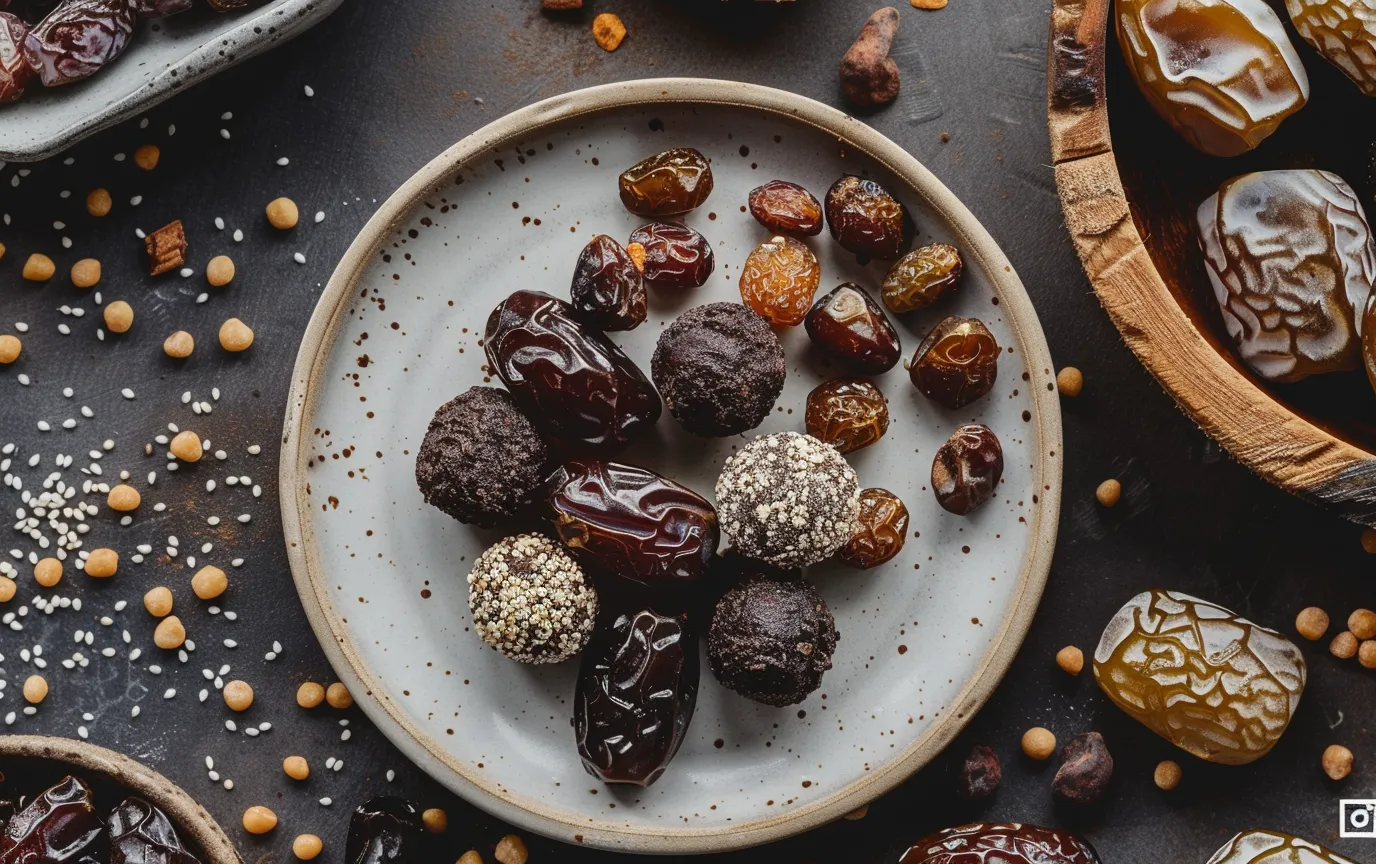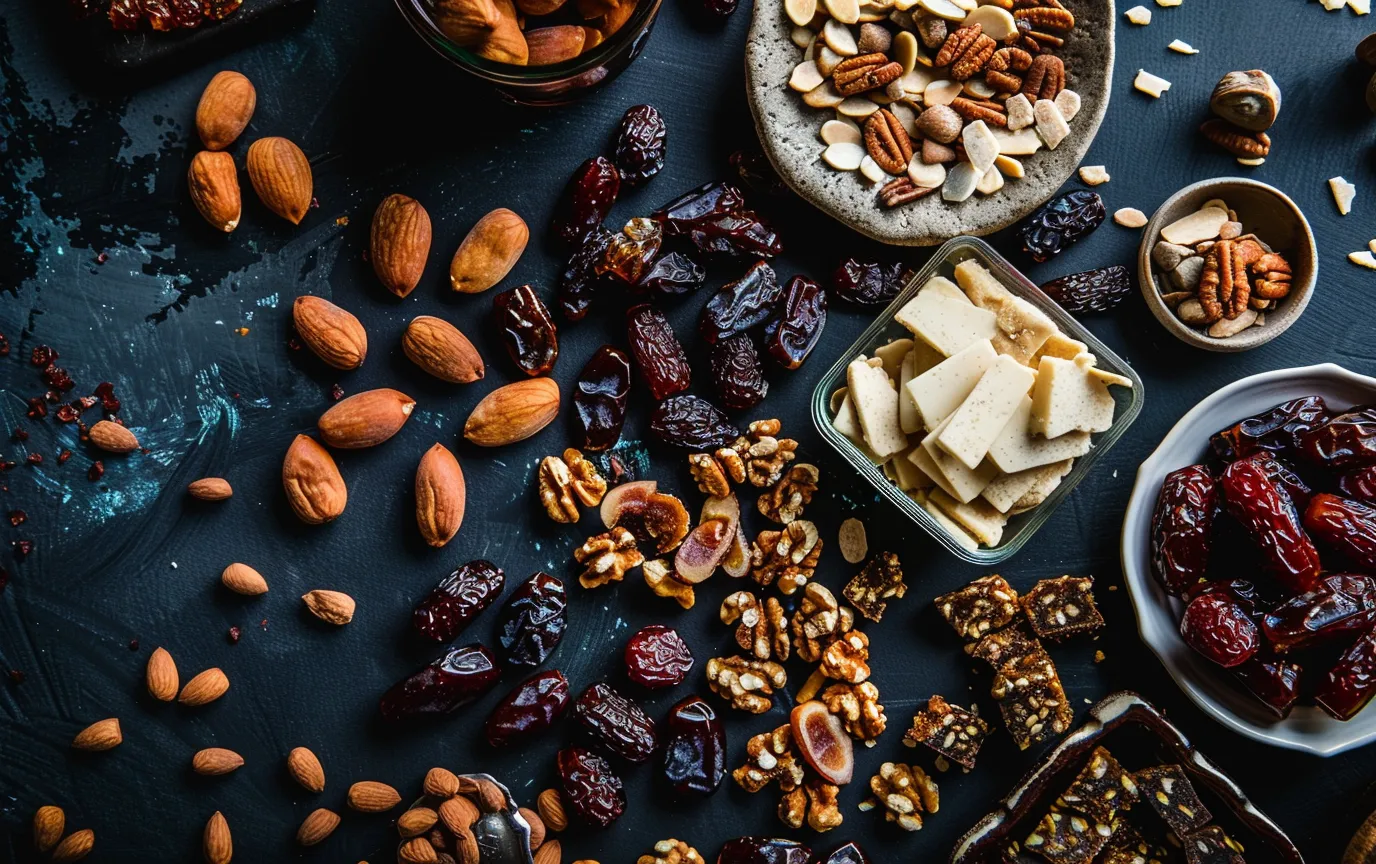

Dates, the fruit of the date palm tree, have been a staple food in many parts of the world for thousands of years. These sweet, chewy fruits are not only delicious but also packed with an impressive array of nutrients and health benefits.

Nutritional Profile of Dates
Dates are a nutritional powerhouse, offering a wide range of essential vitamins, minerals, and other beneficial compounds.

Here’s a breakdown of the key nutrients found in dates:
- Vitamins: Thiamine (B1), Riboflavin (B2), Niacin (B3), Vitamin B6, Folate (B9), Vitamin A, Vitamin K
- Minerals: Potassium, Magnesium, Copper, Manganese, Iron, Phosphorus, Calcium, Zinc, Selenium
- Fiber: Both soluble and insoluble fiber
- Antioxidants: Flavonoids, carotenoids, and phenolic acids
- Amino Acids: 23 types of amino acids found in varying quantities

One Medjool date (about 24 grams) typically contains:
- Calories: 66.5
- Carbohydrates: 18g
- Fiber: 1.6g
- Protein: 0.4g
- Fat: 0g
- Potassium: 167mg (4% of Daily Value)
- Magnesium: 13mg (3% of Daily Value)
- Copper: 0.1mg (10% of Daily Value)
It’s important to note that while dates are nutrient-dense, they are also high in natural sugars and calories. Therefore, moderation is key when incorporating them into your diet.

Key Health Benefits of Dates
Digestive Health
Dates are an excellent source of dietary fiber, which is crucial for maintaining a healthy digestive system.
The fiber in dates can:
- Promote regular bowel movements and prevent constipation
- Support the growth of beneficial gut bacteria
- Help alleviate symptoms of digestive disorders like IBS
- Potentially reduce the risk of colon cancer
To harness these benefits, try soaking dates overnight in water and consuming them first thing in the morning for a gentle laxative effect.

Heart Health
Several components of dates contribute to cardiovascular health:
- Potassium: Helps regulate blood pressure and reduce the risk of stroke
- Magnesium: Supports heart rhythm and reduces the risk of heart disease
- Antioxidants: Help reduce inflammation and oxidative stress, which are risk factors for heart disease
- Fiber: Helps lower LDL (bad) cholesterol levels
Research has shown that regular consumption of dates may help reduce triglyceride levels and decrease the risk of atherogenesis, the formation of fatty plaques in arteries.
Brain Health
The antioxidants in dates, particularly flavonoids, may help protect brain health:
- Reduce inflammation in the brain
- Lower the risk of neurodegenerative diseases like Alzheimer’s and Parkinson’s
- Improve cognitive function and memory
Some studies have suggested that date consumption may help reduce the formation of amyloid beta proteins, which are associated with Alzheimer’s disease.
Blood Sugar Regulation
Despite their sweetness, dates have a low glycemic index, meaning they don’t cause rapid spikes in blood sugar levels. The fiber in dates also helps slow down the absorption of sugars.
However, people with diabetes should still consume dates in moderation and under the guidance of a healthcare professional.
Bone Health
Dates contain several minerals that are essential for bone health:
- Calcium: Crucial for bone formation and strength
- Phosphorus: Works with calcium to build strong bones
- Magnesium: Helps with calcium absorption and bone mineralization
Regular consumption of dates may help reduce the risk of osteoporosis, especially in older adults.
Anemia Prevention
Dates are a good source of iron, which is essential for preventing iron-deficiency anemia. Iron is crucial for the production of hemoglobin, which carries oxygen in the blood.
Consuming dates along with vitamin C-rich foods can enhance iron absorption.
Natural Energy Boost
The natural sugars in dates (glucose, fructose, and sucrose) provide a quick source of energy.
Unlike processed sugars, the fiber in dates helps slow down the absorption of these sugars, providing sustained energy without the crash associated with sugary snacks.
Pregnancy and Childbirth
Some studies suggest that consuming dates during the last few weeks of pregnancy may:
- Help promote cervical dilation
- Reduce the need for induced labor
- Decrease the duration of labor
While more research is needed, the nutrient profile of dates makes them a healthy choice for expectant mothers when consumed as part of a balanced diet.
Anti-Inflammatory Properties
The antioxidants in dates, particularly flavonoids and phenolic acid, have anti-inflammatory properties. This may help reduce the risk of various chronic diseases associated with inflammation, including arthritis, cardiovascular disease, and certain types of cancer.
Skin Health
The vitamin C and D in dates contribute to skin health by:
- Promoting collagen production
- Improving skin elasticity
- Reducing the appearance of wrinkles
Additionally, dates contain pantothenic acid (vitamin B5), which may help improve skin hydration and reduce skin blemishes.
Creative Ways to Incorporate Dates into Your Diet
- As a Natural Sweetener: Use pureed dates as a substitute for sugar in baking recipes or smoothies.
- Energy Balls: Blend dates with nuts, seeds, and cocoa powder to make healthy energy balls.
- Stuffed Dates: Fill pitted dates with nut butter, cheese, or nuts for a quick, nutritious snack.
- Date Syrup: Make a homemade date syrup to use as a healthier alternative to refined sugar in recipes.
- Salad Topping: Chop dates and add them to salads for a sweet contrast to savory ingredients.
- Smoothie Boost: Add a few dates to your morning smoothie for natural sweetness and extra nutrients.
- Savory Dishes: Incorporate chopped dates into stews, tagines, or couscous dishes for a touch of sweetness.
- Breakfast Topping: Sprinkle chopped dates over oatmeal, yogurt, or whole-grain toast.
- Homemade Granola: Add chopped dates to your homemade granola mix for extra flavor and nutrition.
- Date and Nut Bars: Make your own healthy snack bars using dates as a base, combined with nuts and seeds.
Popular Date Varieties in Eastern Europe and Central Asia
Medjool Dates
- Origin: Morocco, now widely cultivated
- Characteristics: Large, soft, sweet with caramel-like flavor
- Uses: Eaten fresh, popular in desserts
Deglet Noor Dates
- Origin: Algeria and Tunisia
- Characteristics: Medium-sized, semi-dry, nutty flavor
- Uses: Versatile, good for cooking and baking
Barhi Dates
- Origin: Iraq
- Characteristics: Small, very sweet, soft when fresh
- Uses: Often eaten in the yellow khalal stage
Mazafati Dates
- Origin: Iran
- Characteristics: Dark, soft, rich flavor
- Uses: Eaten fresh, used in confectionery
Piarom Dates
- Origin: Iran
- Characteristics: Long, thin, semi-dry, lower sugar content
- Uses: Stuffing, snacking, suitable for diabetics
Khadrawy Dates
- Origin: Iraq
- Characteristics: Soft, mahogany color, mild sweet flavor
- Uses: Snacking, desserts
Zahidi Dates
- Origin: Iraq
- Characteristics: Medium-sized, golden color, semi-dry
- Uses: Baking, cooking, long shelf life
Precautions and Considerations
While dates offer numerous health benefits, it’s important to keep the following in mind:
- Calorie Content: Dates are calorie-dense, so be mindful of portion sizes if you’re watching your weight.
- Sugar Content: Although the sugars in dates are natural, they can still affect blood sugar levels. People with diabetes should consult their healthcare provider about incorporating dates into their diet.
- Allergies: While rare, some people may be allergic to dates. If you experience any allergic reactions, discontinue use and consult a doctor.
- Sulfites: Some dried dates may contain added sulfites as a preservative. If you’re sensitive to sulfites, look for unsulfured dates.
- Dental Health: Due to their high sugar content and sticky texture, it’s important to practice good oral hygiene after consuming dates.
- Interaction with Medications: The high potassium content in dates may interact with certain medications, such as beta-blockers. Consult your healthcare provider if you have any concerns.
Unlock the Power of Dates for Optimal Health
Dates, a nutritional powerhouse, offer a wide array of health benefits. Packed with essential nutrients, dates support digestion, heart health, and may even ease pregnancy and childbirth.
Their versatility makes them a perfect addition to any balanced diet, whether as a natural sweetener, quick snack, or creative ingredient.
Embrace the goodness of dates and unlock their potential to elevate your well-being. Incorporate this delicious and nutrient-rich superfood into your meals and enjoy the many benefits nature has to offer.




